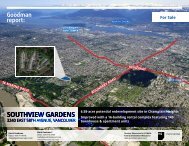Canada
MER-Canada-2016
MER-Canada-2016
Create successful ePaper yourself
Turn your PDF publications into a flip-book with our unique Google optimized e-Paper software.
TECHNICAL COMPLIANCE ANNEX<br />
Criterion 24.1— Federal legal persons: Innovation, Science and Economic Development <strong>Canada</strong><br />
(ISED), formerly Industry <strong>Canada</strong>, provides a comprehensive overview and comparison on its<br />
internet homepage of the various legal entities available and their forms and basic features. All legal<br />
entities established at the federal level are subject to registration. Given that corporations are by far<br />
the most utilized type of legal entity in <strong>Canada</strong>, particular emphasis is put on information pertaining<br />
to federal corporations under CBCA and their incorporation and registration process, which can be<br />
initiated online or by sending all required documents to the competent registrar via email, fax, or<br />
mail. 125 ISED also offers a search tool, which makes some basic information of federal companies<br />
publicly available. The search function also indicates the legislation the corporation is incorporated<br />
under, which in turn clarifies basic regulating powers. Provincial legal persons: Similar information<br />
and services are provided through the homepages of all provincial governments except that of New<br />
Brunswick. The relevant web links are easy to find through ISED’s homepage and provide public<br />
access to the relevant provincial laws that describe the various legal entities available; the name and<br />
contact information for the relevant authority competent for registration; and the procedures to be<br />
followed to establish a legal entity or to register a corporation. Partnerships and foreign entities:<br />
Partnerships and foreign entities operating in any of <strong>Canada</strong>’s provinces or territories are subject to<br />
registration at the provincial level. The <strong>Canada</strong> Business Network maintains a homepage that<br />
provides links to the various provincial and territorial business registries.<br />
Criterion 24.2— The NRA identified privately held corporations as being highly vulnerable to<br />
misuse for ML/TF purposes. The conclusion was reached based on the understanding that such<br />
corporations can easily be established and be used to conceal beneficial ownership. The risk<br />
assessment determines the inherent risks involved with legal persons based on factors such as the<br />
products and services offered by legal entities, the types of persons that may establish or control a<br />
legal person, the possible geographic reach of a Canadian legal entity, and taking into account<br />
FINTRAC statistics on typologies involving legal entities in <strong>Canada</strong>.<br />
Technical compliance Annex<br />
Basic Information<br />
Criterion 24.3— Both federal and provincial corporations, NPOs with legal personality and<br />
cooperatives are established through incorporation by the relevant incorporating department or<br />
agency. Federal legal persons: On the federal level, ISED, as part of the incorporation and annual filing<br />
process, collects and publishes information comprising the corporation’s name, type, status,<br />
corporation number, registered office address in <strong>Canada</strong>, name and address of all directors, and<br />
governing legislation. The regulating powers for federal corporations are set out in the legislation or<br />
in the corporation’s articles, which are approved by the Director appointed under the relevant Act.<br />
Provincial legal persons: Company information including the corporate name, type, status, registered<br />
office in <strong>Canada</strong>, and name and address of directors is collected through the same process as on the<br />
federal level, which is through annual filing procedures. Partnerships and foreign entities: Business<br />
registration requirements vary between the different provinces and territories, but usually require<br />
the provision of the name, registered office, mailing address, place of business in the<br />
province/territory, the date and jurisdiction of incorporation (for extraterritorial companies) or type<br />
125 www.ic.gc.ca/eic/site/cd-dgc.nsf/eng/cs04843.html#articles.<br />
Anti-money laundering and counter-terrorist financing measures in <strong>Canada</strong> - 2016 © FATF and APG 2016<br />
163




